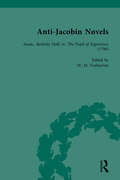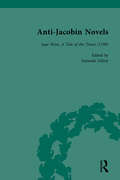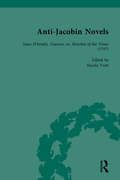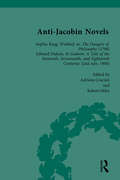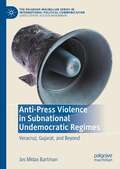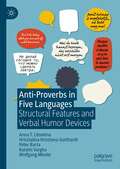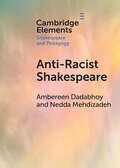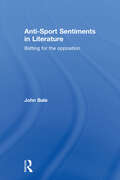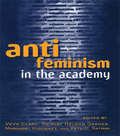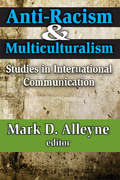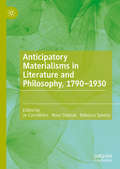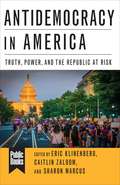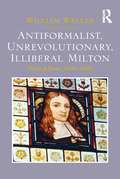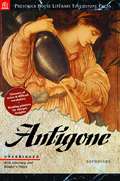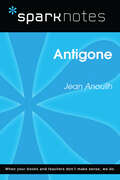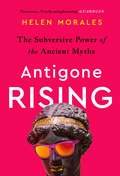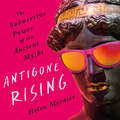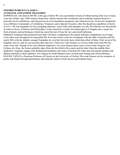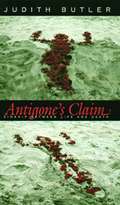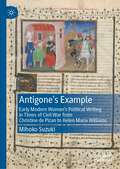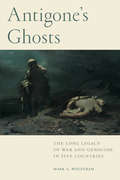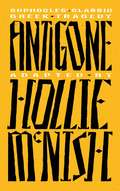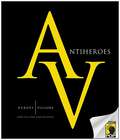- Table View
- List View
Anti-Jacobin Novels, Part II, Volume 6
by Richard Cronin Philip Cox Adriana Craciun W M Verhoeven Claudia L JohnsonA selection of Anti-Jacobin novels reprinted in full with annotations. The set includes works by male and female writers holding a range of political positions within the Anti-Jacobin camp, and represents the French Revolution, American Revolution, Irish Rebellion and political unrest in Scotland.
Anti-Jacobin Novels, Part II, Volume 7
by Richard Cronin Philip Cox Adriana Craciun W M Verhoeven Claudia L JohnsonA selection of Anti-Jacobin novels reprinted in full with annotations. The set includes works by male and female writers holding a range of political positions within the Anti-Jacobin camp, and represents the French Revolution, American Revolution, Irish Rebellion and political unrest in Scotland.
Anti-Jacobin Novels, Part II, Volume 8
by Richard Cronin Philip Cox Adriana Craciun W M Verhoeven Claudia L JohnsonA selection of Anti-Jacobin novels reprinted in full with annotations. The set includes works by male and female writers holding a range of political positions within the Anti-Jacobin camp, and represents the French Revolution, American Revolution, Irish Rebellion and political unrest in Scotland.
Anti-Jacobin Novels, Part II, Volume 9
by Richard Cronin Philip Cox Adriana Craciun W M Verhoeven Claudia L JohnsonA selection of Anti-Jacobin novels reprinted in full with annotations. The set includes works by male and female writers holding a range of political positions within the Anti-Jacobin camp, and represents the French Revolution, American Revolution, Irish Rebellion and political unrest in Scotland.
Anti-Press Violence in Subnational Undemocratic Regimes: Veracruz, Gujarat, and Beyond (The Palgrave Macmillan Series in International Political Communication)
by Jos Midas BartmanThe global trend of increasing violence against the press has spurred research interest into the questions of where, why, and how communicators are repressed. As a result, scholarship has demonstrating that hybrid regimes - which mix undemocratic and democratic elements - constitute a specifically dangerous and lethal context for these actors. Decentralized countries, in which some subnational political elites have retained authoritarian features, have been identified as the most perilous context for communicators. However, despite the burgeoning interest in illiberal practices and repression on the subnational level, it is still relatively unexplored how and why subnational political elites repress communicators within their multi-level setting. The author argues that communicators in subnational undemocratic regimes who can spread the scope of compromising information beyond subnational boundaries can cause uncertainties for subnational undemocratic regimes. The book explores how the political elites of these regimes repress these communicators in response.
Anti-Proverbs in Five Languages: Structural Features and Verbal Humor Devices
by Wolfgang Mieder Anna T. Litovkina Hrisztalina Hrisztova-Gotthardt Péter Barta Katalin VarghaThis book is the first comparative study of English, German, French, Russian and Hungarian anti-proverbs based on well-known proverbs. Proverbs are by no means fossilized texts but are adaptable to different times and changed values. While anti-proverbs can be considered as variants of older proverbs, they can also become new proverbs reflecting a more modern worldview. Anti-proverbs are therefore a lingo-cultural phenomenon that deserves the attention of cultural and literary historians, folklorists, linguists, and general readers interested in language and wordplay.
Anti-Racist Shakespeare (Elements in Shakespeare and Pedagogy)
by Nedda Mehdizadeh Ambereen DadabhoyAnti-Racist Shakespeare argues that Shakespeare is a productive site to cultivate an anti-racist pedagogy. Our study outlines the necessary theoretical foundations for educators to develop a critical understanding of the longue durée of racial formation so that they can implement anti-racist pedagogical strategies and interventions in their classrooms. This Element advances teaching Shakespeare through race and anti-racism in order to expose students to the unequal structures of power and domination that are systemically reproduced within society, culture, academic disciplines, and classrooms. We contend that this approach to teaching Shakespeare and race empowers students not only to see these paradigms but also to take action by challenging and overturning them. This title is also available as Open Access on Cambridge Core.
Anti-Sport Sentiments in Literature: Batting for the Opposition
by John BaleThis book draws on literature, specifically on the writings of selected novelists and poets to widen an existing anti-sport discourse to include hitherto excluded voices from the world of literature. The book commences with a review of exiting pro- and anti-sport discourses and then proceeds to examine, in turn, the written works of five eminent authors, excavating from their writings their anti-sports rhetorics. These writers are Lewis Carroll (Charles Dodgson), Charles Hamilton Sorley, Jerome K. Jerome, John Betjeman and Alan Sillitoe. In its conclusion, the book draws together the broad themes discussed in the preceding chapters. Innovative in its approach to sport and literature and remarkable for its not having been previously explored in any depth, this book will be of interest to readers from both social sciences and humanities backgrounds.
Anti-feminism in the Academy
by Ketu H. Katrak Margaret Higonnet VèVè Clark Shirley Nelson GarnerContending that the anti-feminist backlash in the academy is part of the broader "politically correct" rhetoric, this collection of writers, academics and activists is a much-needed response to the assault on feminist thinkers and critics in the academy today.
Anti-racism and Multiculturalism: Studies in International Communication (Studies In International Communication Ser.)
by Mark D. AlleyneAll scholarly books are engagements with the existing literature, often the published scholarly work of one established discipline. This book originated with modest objectives, to produce a work that would be in conversation with the literature of international relations even though not of relevance only to that field. The professed goal of international relations is international peace. The ethical lens of pondering the best means to achieve world peace is used to filter media content in the field of multiculturalism and anti-racism. Although there has been little work on the impact of racial difference on the contours of contemporary international order, there has been a sizeable body of research intended to abolish the credibility of pseudo-scientific racism. Such racism has provided the ideological foundation and justification for imperialism, colonialism, the holocaust, and apartheid. Race has been debunked as a myth. Because of this, racism - the ideology bred of human classification according to racial difference - has been found to be intellectually and morally barren. But the need to communicate egalitarian and scientific sentiments remains. The contributors to this volume consider five questions: How does the literature on antiracism improve our understanding of conflict resolution? How does the analysis of the media's role in racist and anti-racist discourses improve the process of theorizing on hate and war propaganda? How can research on anti-racist discourse improve UN peacekeeping? What implications does this subject have for theory-building and cultural diversity? How and why should the literature on anti-racism expand research in international relations? This is a unique, worthwhile framework for cross-disciplinary research in race and intellectual consensus and conflict.
Anticipatory Materialisms in Literature and Philosophy, 1790–1930
by Jo Carruthers Nour Dakkak Rebecca SpenceAnticipatory Materialisms explores nineteenth and early twentieth-century literature thatanticipates and pre-empts the recent philosophical ‘turn’ to materiality and affect. Critical volumes that approach literature via the prism of New Materialism are in the ascendence. This collection stakes a different claim: by engaging with neglected theories of materiality in literary and philosophical works that antedate the twenty-first century ‘turn’ to New Materialism and theories of affect, the project aims to establish a dialogue between recent theoretical considerations of people-world relations in literature and that which has gone before. This project seeks to demonstrate the particular and meaningful ways in which interactions between people and the physical world were being considered in literature between the nineteenth and early twentieth centuries. The project does not propose an air of finality; indeed, it is our hope that offering provocative and challenging chapters, which approach the subject from various critical and thematic perspectives, the collection will establish a broader dialogue regarding the ways in philosophy and literature have intersected and informed each other over the course of the long nineteenth century.
Antidemocracy in America: Truth, Power, and the Republic at Risk (Public Books Series)
by Saskia Sassen Pedro Noguera Judith Butler Craig Calhoun Wendy Brown Thomas J. Sugrue Douglas S. Massey Fred Turner Margaret Levi William Julius Wilson Linda Gordon Richard Sennett Steven Lukes Michelle Jackson Victor Pickard Patrick Sharkey Philip Gorski David B. Grusky Jefferson Cowie Scott J. Shapiro Lisa Wade Jack Halberstam Oona A. Hathaway Daniel Aldana Cohen Shamus Khan Alina Das Michelle Wilde Anderson Gretchen Blake Richard Shrum Tanya Marie Luhrmann Harel. Shapira Ashley Farmer Professor of Sociology Michele LamontOn Election Day in 2016, it seemed unthinkable to many Americans that Donald Trump could become president of the United States. But the victories of the Obama administration hid from view fundamental problems deeply rooted in American social institutions and history. The election’s consequences drastically changed how Americans experience their country, especially for those threatened by the public outburst of bigotry and repression. Amid the deluge of tweets and breaking news stories that turn each day into a political soap opera, it can be difficult to take a step back and see the big picture. <P><P>To confront the threats we face, we must recognize that the Trump presidency is a symptom, not the malady.Antidemocracy in America is a collective effort to understand how we got to this point and what can be done about it. Assembled by the sociologist Eric Klinenberg as well as the editors of the online magazine Public Books, Caitlin Zaloom and Sharon Marcus, it offers essays from many of the nation’s leading scholars, experts on topics including race, religion, gender, civil liberties, protest, inequality, immigration, climate change, national security, and the role of the media. Antidemocracy in America places our present in international and historical context, considering the worldwide turn toward authoritarianism and its varied precursors. Each essay seeks to inform our understanding of the fragility of American democracy and suggests how to protect it from the buried contradictions that Trump’s victory brought into public view.
Antiformalist, Unrevolutionary, Illiberal Milton: Political Prose, 1644-1660
by William WalkerOn the basis of a close reading of Milton's major published political prose works from 1644 through to the Restoration, William Walker presents the anti-formalist, unrevolutionary, illiberal Milton. Walker shows that Milton placed his faith not so much in particular forms of government as in statesmen he deemed to be virtuous. He reveals Milton's profound aversion to socio-political revolution and his deep commitments to what he took to be orthodox religion. He emphasises that Milton consistently presents himself as a champion not of heterodox religion, but of 'reformation'. He observes how Milton's belief that all men are not equal grounds his support for regimes that had little popular support and that did not provide the same civil liberties to all. And he observes how Milton's powerful commitment to a single religion explains his endorsement of various English regimes that persecuted on grounds of religion. This reading of Milton's political prose thus challenges the current consensus that Milton is an early modern exponent of republicanism, revolution, radicalism, and liberalism. It also provides a fresh account of how the great poet and prose polemicist is related to modern republics that think they have separated church and state.
Antigone
by SophoclesTo make this quintessential Greek drama more accessible to the modern reader, this Prestwick House Literary Touchstone Edition? includes a glossary of difficult terms, a list of vocabulary words, and convenient sidebar notes. By providing these, it is our intention that readers will more fully enjoy the beauty, wisdom, and intent of the play. The curse placed on Oedipus lingers and haunts a younger generation in this new and brilliant translation of Sophocles? classic drama. The daughter of Oedipus and Jocasta, Antigone is an unconventional heroine who pits her beliefs against the King of Thebes in a bloody test of wills that leaves few unharmed. Emotions fly as she challenges the king for the right to bury her own brother. Determined but doomed, Antigone shows her inner strength throughout the play. Antigone raises issues of law and morality that are just as relevant today as they were more than two thousand years ago. Whether this is your first reading or your twentieth, Antigone will move you as few pieces of literature can.
Antigone (SparkNotes Literature Guide Series)
by SparkNotesAntigone (SparkNotes Literature Guide) by Jean Anouilh Making the reading experience fun! Antigone (SparkNotes Literature Guide) Created by Harvard students for students everywhere, SparkNotes is a new breed of study guide: smarter, better, faster.Geared to what today's students need to know, SparkNotes provides:*chapter-by-chapter analysis *explanations of key themes, motifs, and symbols *a review quiz and essay topics Lively and accessible, these guides are perfect for late-night studying and writing papers.
Antigone Rising: The Subversive Power of the Ancient Myths
by Helen MoralesA witty, inspiring reckoning with the ancient Greek and Roman myths and their legacy, from what they can illuminate about #MeToo to the radical imagery of Beyoncé.The picture of classical antiquity most of us learned in school is framed in certain ways -- glossing over misogyny while omitting the seeds of feminist resistance. Many of today's harmful practices, like school dress codes, exploitation of the environment, and rape culture, have their roots in the ancient world.But in Antigone Rising, classicist Helen Morales reminds us that the myths have subversive power because they are told -- and read -- in different ways. Through these stories, whether it's Antigone's courageous stand against tyranny or the indestructible Caeneus, who inspires trans and gender queer people today, Morales uncovers hidden truths about solidarity, empowerment, and catharsis.Antigone Rising offers a fresh understanding of the stories we take for granted, showing how we can reclaim them to challenge the status quo, spark resistance, and rail against unjust regimes.
Antigone Rising: The Subversive Power of the Ancient Myths
by Helen MoralesA witty, inspiring reckoning with the ancient Greek and Roman myths and their legacy, from what they can illuminate about #MeToo to the radical imagery of Beyoncé.The picture of classical antiquity most of us learned in school is framed in certain ways -- glossing over misogyny while omitting the seeds of feminist resistance. Many of today's harmful practices, like school dress codes, exploitation of the environment, and rape culture, have their roots in the ancient world.But in Antigone Rising, classicist Helen Morales reminds us that the myths have subversive power because they are told -- and read -- in different ways. Through these stories, whether it's Antigone's courageous stand against tyranny or the indestructible Caeneus, who inspires trans and gender queer people today, Morales uncovers hidden truths about solidarity, empowerment, and catharsis.Antigone Rising offers a fresh understanding of the stories we take for granted, showing how we can reclaim them to challenge the status quo, spark resistance, and rail against unjust regimes.(P) 2020 Hachette Audio
Antigone and other Tragedies: Antigone, Deianeira, Electra (Oxford World's Classics.)
by Sophocles Oliver TaplinSophocles stands as one of the greatest dramatists of all time, and one of the most influential on artists and thinkers over the centuries. His plays are deeply disturbing and unpredictable, unrelenting and open-ended, refusing to present firm answers to the questions of human existence, or to provide a redemptive justification of the ways of gods to men-or women. These three tragedies portray the extremes of human suffering and emotion, turning the heroic myths into supreme works of poetry and dramatic action.
Antigone's Claim: Kinship Between Life and Death (The Wellek Library Lectures)
by Judith ButlerThe celebrated author of Gender Trouble here redefines Antigone's legacy, recovering her revolutionary significance and liberating it for a progressive feminism and sexual politics. Butler's new interpretation does nothing less than reconceptualize the incest taboo in relation to kinship—and open up the concept of kinship to cultural change. <P><P>Antigone, the renowned insurgent from Sophocles's Oedipus, has long been a feminist icon of defiance. But what has remained unclear is whether she escapes from the forms of power that she opposes. Antigone proves to be a more ambivalent figure for feminism than has been acknowledged, since the form of defiance she exemplifies also leads to her death. Butler argues that Antigone represents a form of feminist and sexual agency that is fraught with risk. Moreover, Antigone shows how the constraints of normative kinship unfairly decide what will and will not be a livable life.Butler explores the meaning of Antigone, wondering what forms of kinship might have allowed her to live. Along the way, she considers the works of such philosophers as Hegel, Lacan, and Irigaray. How, she asks, would psychoanalysis have been different if it had taken Antigone—the "postoedipal" subject—rather than Oedipus as its point of departure? If the incest taboo is reconceived so that it does not mandate heterosexuality as its solution, what forms of sexual alliance and new kinship might be acknowledged as a result? The book relates the courageous deeds of Antigone to the claims made by those whose relations are still not honored as those of proper kinship, showing how a culture of normative heterosexuality obstructs our capacity to see what sexual freedom and political agency could be.
Antigone's Example: Early Modern Women's Political Writing in Times of Civil War from Christine de Pizan to Helen Maria Williams
by Mihoko SuzukiThis book investigates early modern women’s interventions in politics and the public sphere during times of civil war in England and France. Taking this transcultural and comparative perspective, and the period designation “early modern” expansively, Antigone’s Example identifies a canon of women’s civil-war writings; it elucidates their historical specificity as well as the transhistorical context of civil war, a context which, it argues, enabled women’s participation in political thought.
Antigone's Ghosts: The Long Legacy of War and Genocide in Five Countries
by Mark A. WolfgramSophocles' play Antigone is a starting point for understanding the perpetual problems of human societies, families, and individuals, who are caught up in the terrible aftermath of mass violence. What is one to do after the killing has stopped? What can be done to prevent a round of new violence? The tragic and dramatic tension in the play is put in motion by setting an unyielding Antigone against King Creon. As we see through the investigation of how Germany, Japan, Spain, Yugoslavia and Turkey have dealt with their histories of mass violence and genocide in the 20th century, the forces represented by Antigone and Creon remain very much part of our world today. Through a comparison of the five countries, their political institutions, and cultural traditions, we begin to appreciate the different pathways that societies have taken when confronting their violent histories. Published by Bucknell University Press. Distributed worldwide by Rutgers University Press.
Antigone: A New Adaptation of the Classic Greek Tragedy
by Hollie McNishA modern retelling of Sophocles' classic play, Antigone, by bestselling writer and poet Hollie McNishAs the daughter of Oedipus, Antigone was dealt a cruel hand at birth - even within the bounds of Grecian tragedy. When her brothers are slain fighting for the throne of Thebes, Antigone finds herself pitted against her uncle, the newly crowned King Creon. In defiance of the king, Antigone buries her brother's body, a choice she may pay for dearly.In this new adaptation, we see Sophocles' play reignited by bestselling poet and writer Hollie McNish. Hollie's considered retelling brings Sophocles' original text to a modern-day audience, illuminating the remarkable resemblances between ancient Greek thought and the society we grapple with today.'[Hollie McNish] writes with honesty, conviction, humour and love . . . She's always been one of my favourites' Kae Tempest
Antigone: A New Adaptation of the Classic Greek Tragedy
by Hollie McNishA modern retelling of Sophocles' classic play, Antigone, by bestselling writer and poet Hollie McNishAs the daughter of Oedipus, Antigone was dealt a cruel hand at birth - even within the bounds of Grecian tragedy. When her brothers are slain fighting for the throne of Thebes, Antigone finds herself pitted against her uncle, the newly crowned King Creon. In defiance of the king, Antigone buries her brother's body, a choice she may pay for dearly.In this new adaptation, we see Sophocles' play reignited by bestselling poet and writer Hollie McNish. Hollie's considered retelling brings Sophocles' original text to a modern-day audience, illuminating the remarkable resemblances between ancient Greek thought and the society we grapple with today.'[Hollie McNish] writes with honesty, conviction, humour and love . . . She's always been one of my favourites' Kae Tempest
Antiheroes: Heroes, Villains, and the Fine Line Between
by Jennifer Crusie Adam-Troy Castro Mary BorsellinoThe most interesting characters are almost never the good guys. Doing the right thing is great and all, but a little bit of darkness—or a lot of it—often makes for a more engaging story. Antiheroes: Heroes, Villains, and the Fine Line Between is dedicated to the dark heroes and sympathetic villains we love. Find out why William McKinley High's agonist Sue Sylvester is essential to Glee. Discover where your favorite comic book character falls on the continuum of good and evil. Weigh in on Twilight's very dangerous boy Edward Cullen: romantic, sparkly hero, or sociopath suffering from Antisocial Personality Disorder? Plus other essays on: The Vampire Diaries' most antiheroic antihero, Damon Salvatore America's favorite serial killer, Dexter Morgan, and the nature (and nurture) of evil The curious appeal of Alias' Arvin Sloane Supernatural's vampire hunter-cum-vampire Gordon Walker The shared monstrosity of Spider-Man, Doc Ock, and the Green Goblin Gun-slinging necromancer Anita Blake, and the benefits (and pitfalls) of embracing the monster within This brand new, e-book only collection of essays—"remixed" from previous Smart Pop series titles—gives a funny and thought-provoking in-depth look at the antihero, from the villains just a little too good to be unequivocal bad guys, and the heroes just a bit too bad to be truly good.
Antimercantilism in Late Medieval English Literature
by Roger A. LaddThis study explores the relationship between ideology and subjectivity in late medieval literature, documenting the trajectory of antimercantile ideology against major developments in economic theory and practice in the later Middle Ages.
